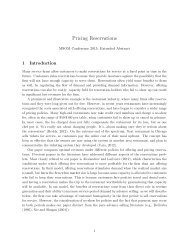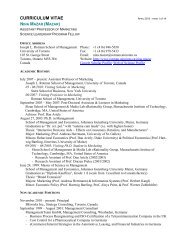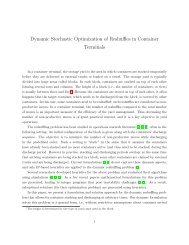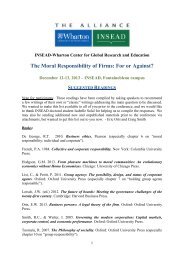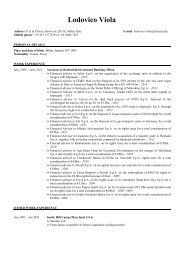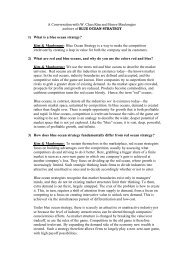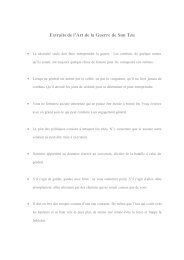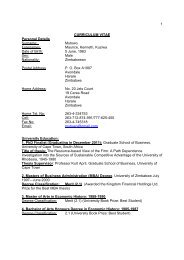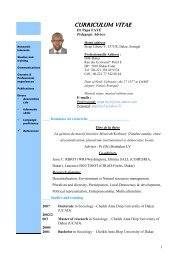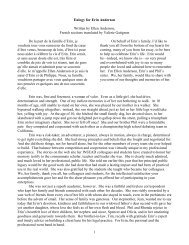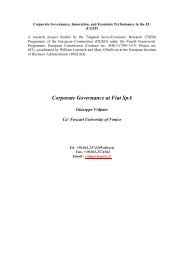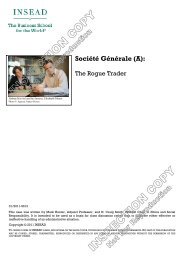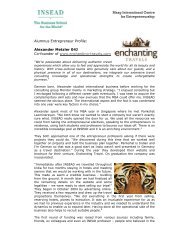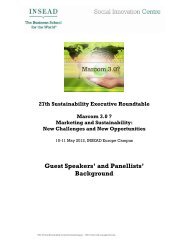RESPONSE - Insead
RESPONSE - Insead
RESPONSE - Insead
You also want an ePaper? Increase the reach of your titles
YUMPU automatically turns print PDFs into web optimized ePapers that Google loves.
Findings: Developing Social Consciousness and SRB in Managers (Objective 4) Introduction<br />
9 Findings: Developing Social Consciousness and SRB in<br />
Managers (Objective 4)<br />
9.1 Introduction<br />
The previous two chapters set out the theoretical basis and methodology for the experimental<br />
designs. This chapter presents results of experimental interventions designed to help managers<br />
develop their sensitivity towards the social impact of their decisions and actions (Social<br />
Consciousness) and thus enact more frequently Socially Responsible Behaviour (SRB). At the<br />
aggregate level, and in connection to the analysis in Part 1, the development of Social Consciousness<br />
is expected to enhance the Cognitive Alignment between the organization and its stakeholders, and<br />
the enactment of Socially Responsible Behaviour by managers is expected to improve the<br />
organizational response to stakeholders’ demands and thus enhance Corporate Social Performance.<br />
The next section presents the analysis of how higher levels of Social Consciousness affect Socially<br />
Responsible Behaviour. Then, the results of the experiments will discuss the extent to which<br />
managerial training techniques can influence Social Consciousness levels, thus completing the study<br />
of the causal chain that goes from Managerial Training to Social Consciousness development and<br />
from Social Consciousness development to Socially Responsible Behaviour (see Figure 10 in Chapter<br />
7).<br />
9.2 Impact of Social Consciousness on Socially Responsible Behaviour<br />
In the websurvey developed for the experimental portion of the study SRB is measured according to<br />
participants’ responses to four ethical dilemmas as described below.<br />
1. Product safety – whether to withdraw a product from the market to conduct sufficient<br />
safety testing<br />
2. Labour conditions tradeoff between low cost production and quality of working<br />
conditions in a decision about a plant closure<br />
3. Product access tradeoff between economic profit and access to medicine for the<br />
world’s poor<br />
4. Community development – trade off between labour productivity and allowing staff to<br />
volunteer for community development projects<br />
A factor analysis was applied to the responses 21 to the four dilemmas described above, which<br />
resulted in an interesting distinction between two dimensions of Socially Responsible Behaviour<br />
(SRB):<br />
1. the first two scenarios described above, related to product safety and labour condition<br />
issues, loaded on one factor, which we labelled ‘do no harm’ SRB.<br />
2. The third and fourth scenarios load on a different factor, related to product access and<br />
community development, loaded on a separate factor, which we labelled “do good”<br />
SRB.<br />
In and of itself, this is an important finding that corroborates the theoretical framework developed for<br />
the analysis of the responses to the interview protocol (see the first framework described in section<br />
5.2).<br />
21 Since this exercise is aimed at providing a baseline evaluation of the link between social<br />
consciousness and SRB, we broadened the analysis to a random sample of 266 managers in two<br />
large companies (also participating companies in the case analysis study), selected among all<br />
managers in level 2 to 4 across all countries. These managers participated (with a 35% response<br />
rate) in a large scale websurvey which included the same items used in the measurement survey for<br />
the experiment. This allows us to validate Hypothesis 1 with a larger population of managers and with<br />
broader representation of the global management population, given the randomization process to<br />
select the sample of invitees.<br />
<strong>RESPONSE</strong>: understanding and responding to societal demands on corporate responsibility<br />
69



